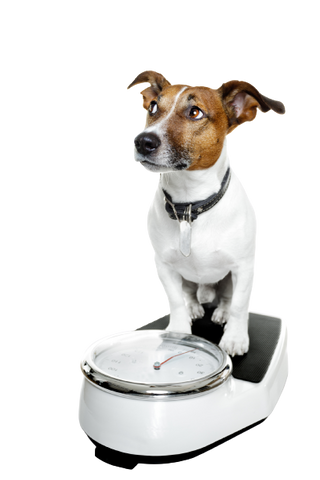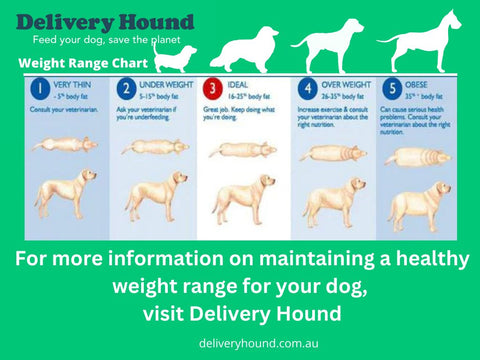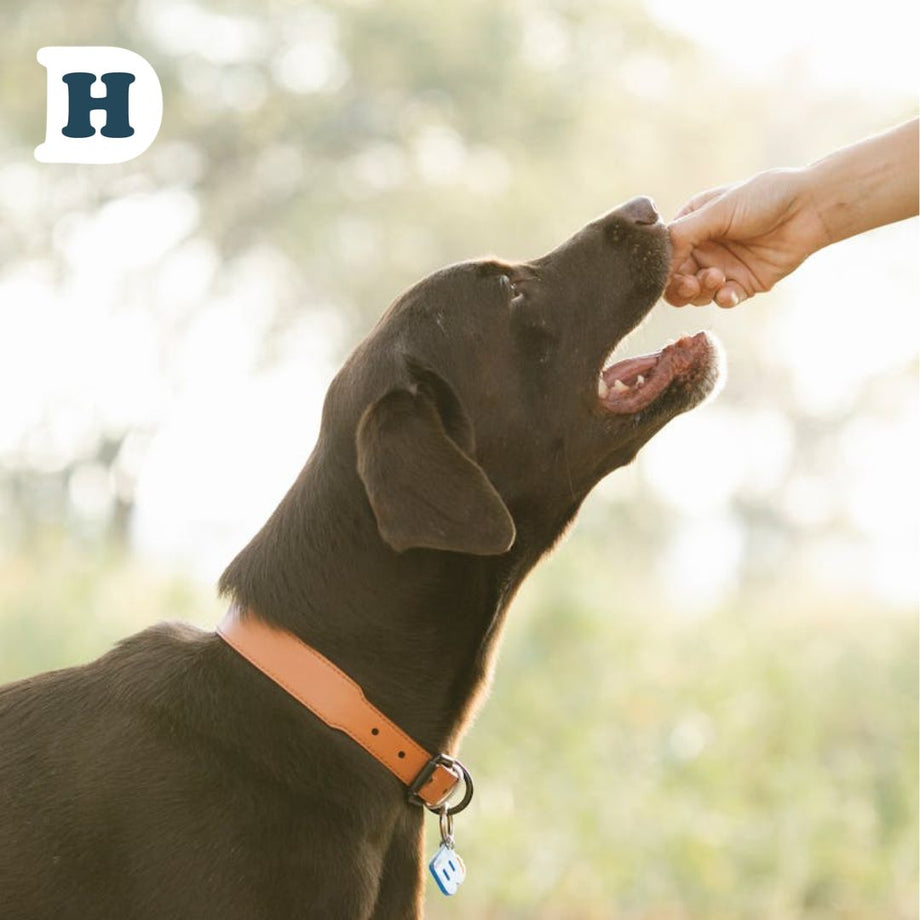Do you ever stop to consider the weight of your furry friend? Just like humans, maintaining a healthy weight is crucial for the overall well-being of dogs. In fact, it plays a significant role in their quality of life and longevity. Whether it's excessive treats, lack of exercise, or an underlying health condition, dogs can easily become overweight, leading to a range of health issues. Here at Delivery Hound HQ, we will explore why weight matters for your dog and the importance of maintaining a healthy weight. From joint problems to heart disease and diabetes, the consequences of obesity in dogs can be severe. We will also provide practical tips and strategies for achieving and maintaining a healthy weight for your four-legged companion. So, if you want your dog to live a long, happy, and active life, keep reading to discover the reasons why weight matters and how you can help your pup stay fit and healthy.
maintaining a healthy weight is crucial for the overall well-being of dogs. In fact, it plays a significant role in their quality of life and longevity. Whether it's excessive treats, lack of exercise, or an underlying health condition, dogs can easily become overweight, leading to a range of health issues. Here at Delivery Hound HQ, we will explore why weight matters for your dog and the importance of maintaining a healthy weight. From joint problems to heart disease and diabetes, the consequences of obesity in dogs can be severe. We will also provide practical tips and strategies for achieving and maintaining a healthy weight for your four-legged companion. So, if you want your dog to live a long, happy, and active life, keep reading to discover the reasons why weight matters and how you can help your pup stay fit and healthy.
The Impact of Weight on a Dog's Health
Maintaining a healthy weight is vital for your dog's overall health. When a dog is overweight, it puts excessive strain on their joints, leading to joint problems such as arthritis. The excess weight also puts a strain on their heart, increasing the risk of heart disease. Additionally, overweight dogs are more susceptible to developing diabetes, as the extra pounds can interfere with their insulin levels. Digestive issues, breathing difficulties, and decreased stamina are also common problems faced by overweight dogs.
It's not just physical health that is affected by weight gain in dogs. Their mental well-being can also be impacted. Overweight dogs may experience a decrease in energy levels, motivation, and overall happiness. They may become less active, leading to boredom and behavioral issues. Maintaining a healthy weight is essential for your dog's overall happiness and quality of life.
Common Health Issues Related to Overweight Dogs
The consequences of obesity in dogs can be severe. One of the most common health issues faced by overweight dogs is joint problems, particularly arthritis. The excessive weight puts pressure on the joints, leading to inflammation and pain. Arthritis can severely limit a dog's mobility and overall quality of life.
Heart disease is another significant concern for overweight dogs. The extra weight puts strain on the heart, making it work harder. This can lead to high blood pressure, heart murmurs, and other cardiovascular issues. The risk of heart failure increases significantly in overweight dogs.
Diabetes is also more prevalent in overweight dogs. The excess weight interferes with insulin levels, making it difficult for the body to regulate blood sugar. This can lead to diabetes, which requires lifelong management and can have serious health complications if not properly addressed.
Other health issues commonly associated with obesity in dogs include respiratory problems, such as difficulty breathing and decreased lung capacity, liver disease, digestive issues, and an increased risk of certain cancers. It's clear that maintaining a healthy weight is crucial for preventing these health problems and ensuring a long and happy life for your furry friend.
The Benefits of Maintaining a Healthy Weight for Your Dog
Maintaining a healthy weight for your dog comes with a multitude of benefits. Firstly, a healthy weight ensures better overall physical health. Your dog will have stronger joints, reducing the risk of arthritis and other joint problems. Their heart will be healthier, reducing the risk of heart disease. They will also have a decreased risk of developing diabetes and other metabolic disorders.
A healthy weight also means better mental health for your dog. They will have more energy, be more motivated, and have an overall happier disposition. Regular exercise and a balanced diet contribute to better mental well-being, keeping your dog engaged and satisfied.
Maintaining a healthy weight also means a longer lifespan for your dog. Obesity significantly decreases a dog's life expectancy. By keeping your dog at a healthy weight, you are increasing their chances of living a longer, happier, and more fulfilling life by reducing the risk of obesity-related health complications.
Understanding Your Dog's Ideal Weight
To maintain a healthy weight for your dog, it's important to understand what their ideal weight should be. Every dog is unique, and their ideal weight can vary depending on factors such as breed, age, and size. Consult with your veterinarian to determine what your dog's ideal weight range should be.
Your veterinarian will consider your dog's breed and body structure to determine the ideal weight range. They may also take into account your dog's age and activity level. It's important to remember that what may be considered overweight for one breed may be normal for another breed. Consulting with your veterinarian is the best way to ensure your dog is at a healthy weight.
How to Determine if Your Dog is Overweight
It's not always easy to determine if your dog is overweight, especially if they are small or fluffy. However, there are a few signs you can look out for. One of the most noticeable signs is a lack of a defined waistline. If your dog's stomach is rounded and lacks a visible waist, it may be an indication of excess weight. You should also be able to feel your dog's ribs without excessive fat covering them. If you are having trouble feeling your dog's ribs, it may be a sign that they are carrying extra weight.
Another way to determine if your dog is overweight is to monitor their energy levels and activity. If your dog seems lethargic and has a decreased interest in physical activity, it may be a result of excess weight. Additionally, if your dog is panting excessively or has difficulty breathing after minimal exercise, it may be a sign that they are carrying too much weight.
Tips for Managing Your Dog's Weight
 Managing your dog's weight requires a combination of diet, exercise, and monitoring. Here are some tips to help you keep your dog at a healthy weight:
Managing your dog's weight requires a combination of diet, exercise, and monitoring. Here are some tips to help you keep your dog at a healthy weight:
Portion control: Measure your dog's food and avoid overfeeding. Follow the recommended feeding guidelines provided by your veterinarian or the dog food manufacturer. Avoid giving excessive treats, as they can contribute to weight gain.
Choose high-quality dog food: Opt for a balanced and nutritionally complete dog food that is appropriate for your dog's age, size, and activity level. Avoid foods that are high in fat and carbohydrates, as they can contribute to weight gain. Man's Best Premium Grain-Free Food for dogs is a complete diet for your dog so you can maintain balance and nutrition.
Avoid table scraps: Human food is often high in calories and can lead to weight gain in dogs. Stick to a balanced and appropriate diet for your dog, and avoid giving them table scraps.
Regular exercise: Engage your dog in regular physical activity to burn calories and maintain a healthy weight. The amount and intensity of exercise will depend on your dog's age, breed, and overall health. Consult with your veterinarian to determine an exercise routine that is suitable for your dog.
Monitor weight: Regularly weigh your dog to ensure they are maintaining a healthy weight. If you notice any weight gain or loss, consult with your veterinarian to address the issue promptly.
Keep treats in moderation: Treats can be a useful tool for training and rewarding your dog, but they should be given in moderation. Opt for low-calorie treats or consider using healthy alternatives, such as small pieces of fruits or vegetables.
Try and keep their food consistent, if you tend to buy different brands all the time, it can be difficult for your dog to maintain the benefits of a healthy diet.
Ensure that you never run out of your dog's food by having it delivered free to your door and Dog Food Delivered Sustainably to your Door Sydney Wide. Delivery Hound delivers a variety of 5 different grain-free recipes. Each recipe is available in a 5kg and 11 kg reusable container. When your dog has finished the food in the container, Delivery Hound will replace it with a fresh one and collect the empty one for cleaning. It is a service based on the principles of the circular economy! Subscribe and save money as well - no lock in contracts!
Our Healthy Dog Feeding Guide will help you work out how often to order. You can change the frequency if you need it either sooner or later.
Remember, managing your dog's weight is a long-term commitment. Consistency and dedication are key to ensuring your dog stays at a healthy weight throughout their life.
Creating a Balanced Diet for Your Dog
A balanced diet is essential for maintaining a healthy weight for your dog. It's important to provide them with the right nutrients while controlling their calorie intake. Here are some tips for creating a balanced diet for your dog:
Consult with your veterinarian: Your veterinarian will be able to recommend a diet that is appropriate for your dog's specific needs. They can provide guidance on the right balance of protein, carbohydrates, and fats, as well as recommend any necessary supplements.
Choose high-quality dog food: Opt for a commercially prepared dog food that is labeled as nutritionally complete and balanced. Look for foods that list natural ingredients such as Man's Best for Dogs. Avoid foods that contain excessive fillers, grains and artificial additives.
Control portion sizes: Measure your dog's food to ensure they are receiving the appropriate amount of calories. Follow the feeding guidelines provided by your veterinarian or the dog food manufacturer. Avoid free-feeding, as it can lead to overeating.
Avoid excessive treats: Treats should be given in moderation and should not exceed 10% of your dog's daily calorie intake. Opt for low-calorie treats or consider using healthy alternatives, such as fruits or vegetables.
Monitor your dog's weight: Regularly weigh your dog to ensure they are maintaining a healthy weight. If you notice any weight gain or loss, adjust their diet accordingly and consult with your veterinarian if needed.
Remember, every dog is unique, and their dietary needs may vary. It's important to consult with your veterinarian to create a diet plan that is tailored to your dog's specific needs.
The Role of Exercise in Maintaining a Healthy Weight
Exercise is a crucial component of maintaining a healthy weight for your dog. Regular physical activity helps burn calories, build muscle, and keep your dog fit and active. Here are some benefits of exercise for your dog's weight management:
Weight control: Regular exercise helps burn calories and prevents weight gain in dogs. It helps maintain a healthy metabolism and keeps your dog's weight in check.
Muscle development: Exercise helps build and maintain muscle mass, which is important for overall strength and mobility. Strong muscles support healthy joints and prevent injuries.
Mental stimulation: Exercise provides mental stimulation for your dog, keeping them engaged and happy. It helps prevent boredom and behavioral issues that can arise from a lack of mental stimulation.
Improved cardiovascular health: Physical activity strengthens the heart and improves cardiovascular health. It helps reduce the risk of heart disease and other cardiovascular issues.
Better overall fitness: Regular exercise improves your dog's overall fitness and stamina. It allows them to engage in physical activities with ease and enjoy an active lifestyle.
The amount and intensity of exercise will depend on your dog's age, breed, and overall health. Consult with your veterinarian to determine an exercise routine that is suitable for your dog. Aim for a combination of aerobic exercise, such as brisk walks or runs, and strength-building activities, such as playing fetch or agility training.
The Importance of Regular Veterinary Check-ups
Weight assessment: Your veterinarian will monitor your dog's weight and body condition during check-ups. They can provide guidance on maintaining a healthy weight and make recommendations if any adjustments to diet or exercise are needed.
Early detection of health issues: Regular check-ups allow your veterinarian to detect any health issues early on. This includes obesity-related health problems, as well as other conditions that may affect your dog's weight and overall well-being.
Professional advice and guidance: Your veterinarian is your best resource for professional advice and guidance on managing your dog's weight. They can provide personalized recommendations based on your dog's specific needs and circumstances.
Vaccinations and preventive care: Regular check-ups ensure that your dog is up to date on vaccinations and preventive care. This helps protect them from diseases and illnesses that can affect their overall health and well-being.
Overall health assessment: Veterinary check-ups provide a comprehensive assessment of your dog's overall health. This includes checking vital signs, examining the teeth and gums, and assessing the condition of the coat and skin.
Regular veterinary check-ups are crucial for maintaining your dog's health and well-being. Make sure to schedule annual or bi-annual check-ups, depending on your veterinarian's recommendations.
Prioritising Your Dog's Weight for a Happy and Healthy Life
Maintaining a healthy weight is essential for your dog's overall well-being and quality of life. The consequences of obesity in dogs can be severe, ranging from joint problems to heart disease and diabetes. By prioritising your dog's weight, you can significantly reduce the risk of these health issues and ensure they live a long, happy, and active life.
Understanding your dog's ideal weight and monitoring their weight regularly are key steps in managing their weight effectively. A balanced diet, portion control, regular exercise, and regular veterinary check-ups all play a crucial role in maintaining a healthy weight for your dog.
Remember, every dog is unique, and their weight management needs may vary. Consult with your veterinarian to create a personalized plan that takes into account your dog's specific needs and circumstances. With dedication and consistency, you can help your furry friend achieve and maintain a healthy weight, leading to a happier and healthier life. So, start prioritising your dog's weight today and enjoy the benefits of a fit and active four-legged companion.
©deliveryhound.com.au 2023







